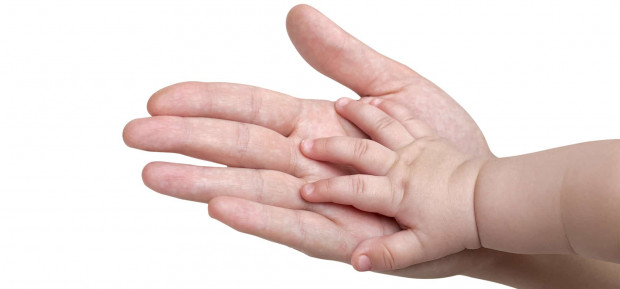Motor skills: at what age does baby roll over?
As a parent, you probably have several questions about your little one's psychomotor development. At what age will baby be able to roll over on his own and go from back to belly? Will he succeed in rocking from belly to back at the same time? Should I help him turn around? Will he be able to hold his head up on his own soon after birth? When will he catch objects? Babybio allows you to better understand the first major stages of a baby's psychomotor development!
At what age does a baby start rolling over?
During the first year of his existence, a child will learn a multitude of things. Every day is an opportunity for him to make great discoveries and acquire new skills. At this age, baby will experience one of the first major stages of his psychomotor development: the fact of being able to turn over in a lying position without the help of mom and dad.
Generally, an infant begins to roll over on its own between its 4th and 6th month (on average); to achieve this, baby must have acquired enough muscle tone. Of course, each child grows and progresses at their own pace: some will need a little more time than others. So no need to worry! Do you still think that your little one is having difficulty? Do not hesitate to talk to the pediatrician before drawing conclusions about his development and motor skills.
What are the main stages of the turnaround?
In the majority of cases, baby first manages to roll from the back to the stomach. He will start by performing this movement several times before succeeding in turning over in the other direction (that is to say from the belly to the back), because the operation is a little more complex. If your child rolls over on his own from the age of 4 months, it is very likely that he has mastered the rollover movement before having acquired the sitting position. It is also thanks to this pendulum movement that he will be able to build up enough muscle, and thus succeed more easily in sitting up around his 6 months, then to walk on all fours a few months later.
How to help baby roll over?
The first turning of the infant is often done a little by chance. When baby is lying on his back, he is attracted by an object he is trying to grab, and almost involuntarily rolls onto his stomach trying to grab it. That doesn't mean there aren't little tricks to prepare him for flipping from an early age!
Anticipating baby's rollover from an early age
To encourage baby to roll over, it is advisable to familiarize your little one with the position lying on his stomach from his first months. Start by putting him on his stomach for a few moments when you change him, then leave him in this position for several minutes when he is 3/4 months old, in the waking phase. Your child will thus learn to place his arms correctly in this position and, above all, will perform gestures that will gradually strengthen the muscles of his neck and back, which will greatly help him to switch to a lying position when he is in age to do so. Also remember to make him make small movements of the pelvis when you change his diaper (gently grasp his legs by bringing them towards his chest then perform slight rotations from left to right). This can help him get used to the pendulum movement that he will have to recreate later to manage to turn around.
let it be baby
Apart from these two practices to prepare baby, it is not recommended to help your child to turn over when he is old enough to do so alone (i.e. around 4/5 months); therefore do not try to tilt him by holding his hands, or by pushing his pelvis slightly: the infant must perform the rotation movements himself to gain confidence and autonomy; no need to chew the job! It is essential that the child can turn over on his own without any outside help!
Stimulate baby at the right time
If baby has to turn over by himself, nothing prevents you from stimulating your child to encourage him to take the plunge. For example, you can show him objects and make him want to grab them by placing them out of his reach: by trying to grab the objects, your child will be able to take the necessary impetus to roll over. And, by dint of hearing your encouragement, he will gain the confidence to succeed in turning around!
Please note: if you notice that your little one is unable to roll over when he is around 6/7 months old, it is important to seek advice from your pediatrician, because the rolling stage is decisive for his future development: your doctor will explain to you why baby can't turn around yet and will help him through the process by observing his movements.
Prioritize free motor skills
The concept of free motor skills was theorized in the 1960s by Emmi Pikler, a Hungarian pediatrician. It consists in letting the infant experience for himself all the movements he can make with his body, by offering him a secure environment conducive to his psychomotor development, and without encouraging him to perform a movement that he is not not able to achieve by itself. Today, the principles of free motor skills are defended by the vast majority of pediatricians and professionals specializing in early childhood. By applying them on a daily basis, you will allow your little one to move easily, which will be a considerable asset when the turnaround stage arrives.
When can you put your baby to sleep on his stomach?
Although it is advisable to leave baby on his stomach every day so that he can become familiar with this position and can strengthen his muscles, the operation must always be carried out under the supervision of an adult; the same is true for infant sleep: it is now strictly advised not to have your child sleep on his stomach during his first months; this recommendation aims to reduce the risk of choking that can occur when baby does not have enough strength to raise his head. However, if your child rolls over on his own in his sleep, don't worry: this means that he has enough muscle tone to be able to move his head and not choke - it is however important to never let bulky items of bedding in his bed that could make it difficult for him to raise his head.
At what age does baby catch objects?
Today, catching simple objects seems very simple to you. But this has not always been the case ! At birth, although the infant instinctively possesses the grasping reflex (consisting of immediately squeezing any object placed in his hand), he is not able to catch an object voluntarily, nor to seize it: l he acquisition of grip and fine motor skills takes place gradually.
Around his 3/4 months, baby will only be able to begin to grasp certain objects placed very close to him, such as the nipple of his bottle, for example. But it will be necessary to wait until he is 8/12 months old so that he can be in full possession of his ability to grasp. Between these two periods, you must encourage and stimulate your little one to help him evolve. For example, install a play mat in his room, and offer him daily small colored objects that are easy to catch, such as small balls with holes and soft objects, for example.
At what age does a baby hold his head alone?
At birth, a child's head is proportionally larger than an adult's in relation to its body; moreover, his muscle tone is not sufficiently developed for him to be able to support his head on his own. This is completely normal, during its first weeks, the axis of the head of the spine is soft (pediatricians speak of the phenomenon of hypotonia). Little by little, your child will become more and more toned at the level of the head and the trunk, which will allow him to be able to move his head from side to side and raise it.
This learning will be done in stages: at two months, baby will begin to raise his head slightly for a few moments, sometimes leaning on his forearms when he is lying on his stomach; at about 4 months, the muscles of his back, trunk and head will be developed enough for him to be able to control his head in an upright position; but again, don't worry if your toddler isn't quite there yet: each child progresses at their own pace! If in doubt, you can of course always seek advice from your pediatrician.
Find all Babybio's advice on baby's development and motor skills online!


